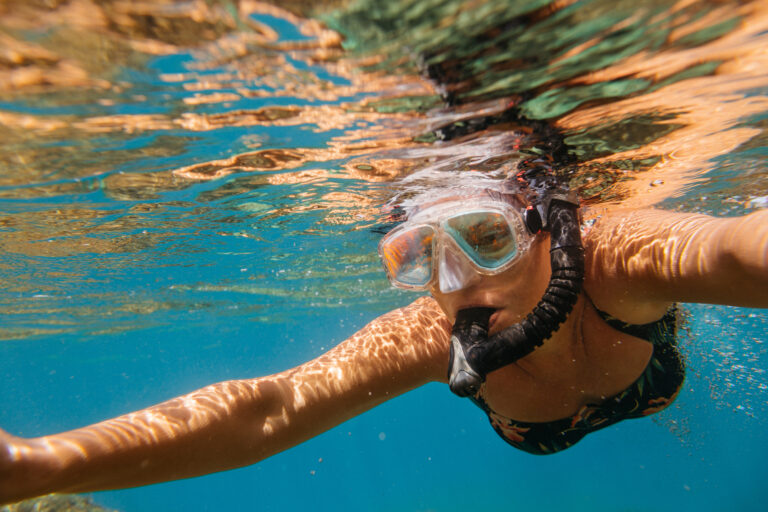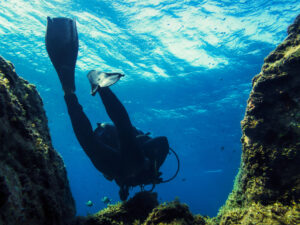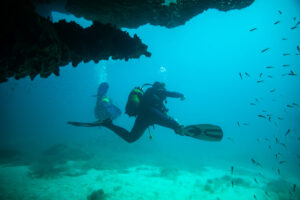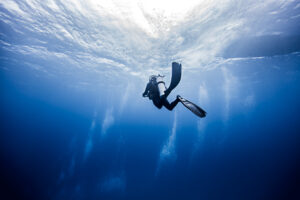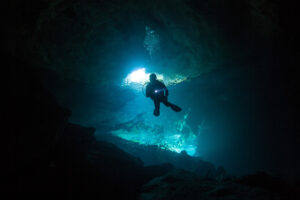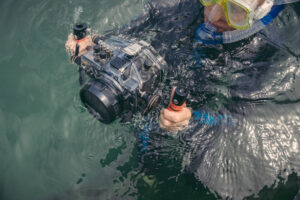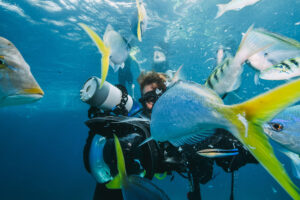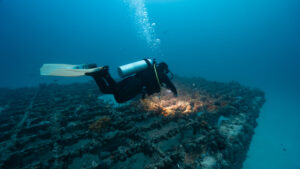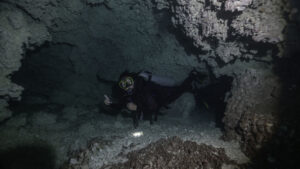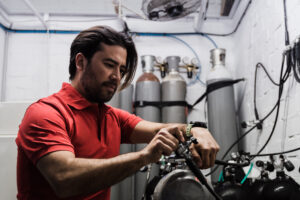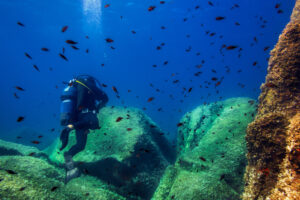What is a Snorkel Keeper?
A snorkel keeper is an often understated yet crucial component of scuba diving, snorkeling, and freediving gear. The snorkel keeper is a device designed to attach the snorkel to the diver’s mask strap. While small and simple in design, its role in providing a seamless diving experience cannot be overstated.
Design and Purpose
The primary function of a snorkel keeper is to ensure that the snorkel remains firmly attached to the mask throughout the dive. This is particularly important, as it prevents the snorkel from becoming a distraction or hazard by moving around excessively during a dive. The snorkel keeper allows the diver to focus on the underwater environment, secure in the knowledge that their snorkel is reliably fixed in place.
The design of the snorkel keeper is usually simple and efficient: it typically consists of a piece of flexible material, often silicone or rubber, with a loop at each end. One loop is designed to fit around the snorkel, and the other to fit over the mask strap. The flexibility of the material allows the snorkel keeper to accommodate various snorkel and mask sizes, making it a universally applicable tool.
Variations and Material Choices
While the basic design of the snorkel keeper has remained unchanged, there are some variations to suit different needs. Some models include a quick-release feature, which allows the snorkel to be easily detached from the mask without removing the mask. This can be particularly useful in situations where the snorkel might become a hindrance, such as when entering or exiting the water.
The material choice for snorkel keepers is primarily influenced by durability and flexibility. Silicone snorkel keepers are common due to their flexibility and long lifespan. Rubber, while slightly less flexible, is also a popular choice due to its robustness and resistance to saltwater corrosion. Some snorkel keepers are even made from plastic, although these are generally less durable and more prone to breaking.
Importance in Safety and Convenience
The importance of the snorkel keeper extends beyond convenience and comfort; it also plays a significant role in ensuring the safety of the diver. A loose or lost snorkel can cause anxiety for novice divers and can be a nuisance for experienced ones. In an emergency situation, such as when surfacing after a deep dive, a diver might require the use of their snorkel to conserve tank air. In such circumstances, a properly secured snorkel could be critical.
Maintenance and Care
Maintenance of the snorkel keeper involves regular inspection for signs of wear and tear. Due to its constant exposure to harsh conditions, including saltwater, sunlight, and physical stress, the snorkel keeper can degrade over time. Regular replacement is recommended to ensure its effectiveness and the diver’s safety. It is also advised to rinse the snorkel keeper with fresh water after each dive to remove salt and other potential corrosives.
Influence on Dive Experience
The impact of a snorkel keeper on a diver’s overall experience is often underestimated. A reliable snorkel keeper allows the diver to maneuver, explore, and enjoy the underwater world without the need to adjust or secure their snorkel constantly. This peace of mind contributes significantly to the overall satisfaction and enjoyment of the dive.
Historical Development
Although the history of the snorkel dates back to ancient times, the introduction of the snorkel keeper as we know it is relatively recent, reflecting the evolution of scuba diving as a recreational sport. In the past, divers often had to improvise ways to secure their snorkels, using materials at hand such as string or even seaweed. The development of the modern snorkel keeper is a testament to the continuous advancements in diving gear to improve divers’ safety, comfort, and convenience.
Choosing the Right Snorkel Keeper
When selecting a snorkel keeper, divers should consider several factors. The diameter of the snorkel and the width of the mask strap can influence the size and type of snorkel keeper required. The material of the snorkel keeper is also important, with divers needing to balance the longevity and durability of the material against its flexibility and ease of use. In addition, divers should consider their personal comfort and preferences. Some may prefer a quick-release feature for convenience, while others may favor a more secure, non-detachable design.
Innovation and Future Trends
As with all scuba diving equipment, innovation continues to shape the future of snorkel keepers. The increasing use of advanced materials and technology promises even more durable and flexible snorkel keepers. For example, new materials that are more resistant to degradation from UV rays and saltwater are being explored.
Moreover, there is a trend toward integrating snorkel keepers with other pieces of equipment. Some mask designs now include built-in snorkel keepers, providing a sleek and streamlined setup. Digital technology also opens up exciting possibilities, such as snorkel keepers with integrated sensors to alert divers when their snorkel is not correctly positioned.
Environmental Considerations
Finally, as the diving community becomes more environmentally conscious, the impact of snorkel keepers on the environment has come into focus. Like all plastic-based items, old or broken snorkel keepers can contribute to marine pollution if not disposed of properly. This has led to a push for more sustainable materials, such as biodegradable or recyclable plastics, to be used in the production of snorkel keepers.
Key Takeaway
While small and seemingly insignificant, the snorkel keeper plays a fundamental role in the scuba diving experience. Its simple design and function belie its importance in safety, convenience, and enhancing the overall dive experience. As with any piece of diving equipment, proper care, and maintenance of the snorkel keeper are crucial to ensure its longevity and effectiveness. The snorkel keeper, in its unassuming role, continues to be an essential accessory for divers, underscoring the attention to detail that characterizes the sport of scuba diving.
In conclusion, the snorkel keeper, an integral component of the diver’s gear, is a perfect example of the adage that ‘the devil is in the detail.’ This small, often overlooked item contributes not only to the practical aspects of snorkeling and scuba diving but also to the safety, comfort, and overall satisfaction of divers. As technology and materials continue to evolve, we can expect the humble snorkel keeper to adapt and improve, enhancing the diving experience even further.

